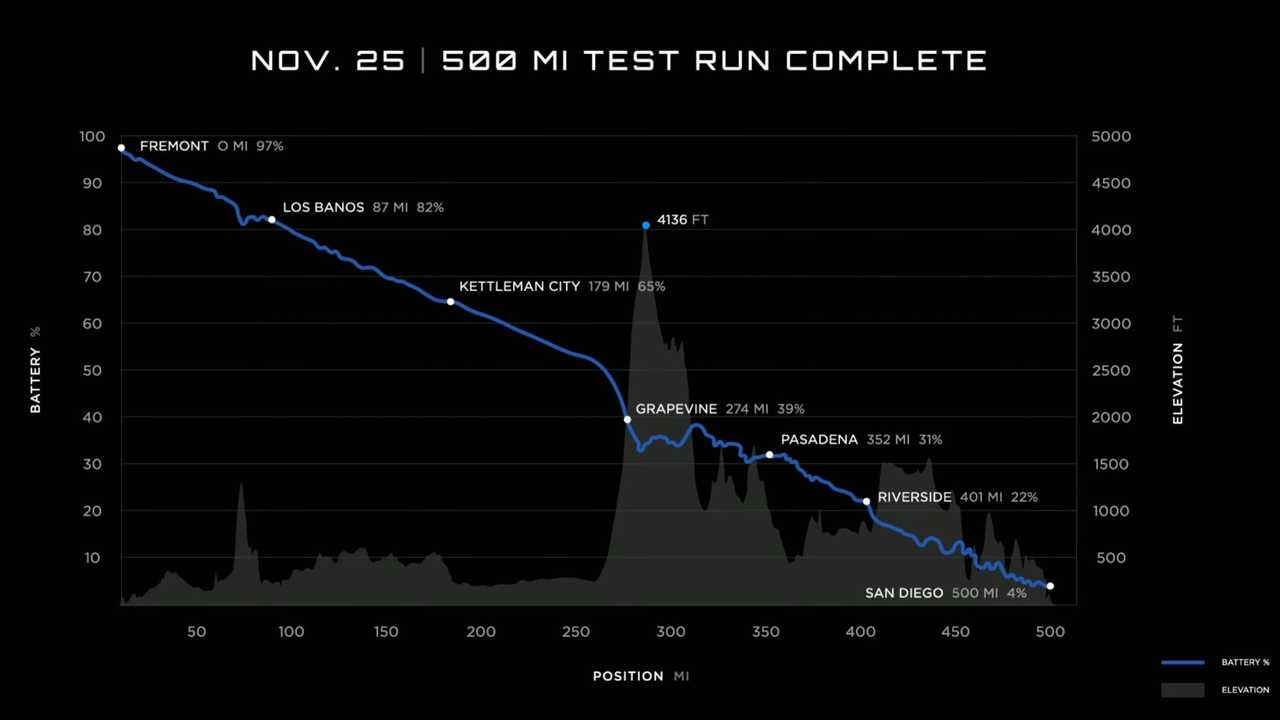The Tesla Semi Class 8 all-electric semi truck, in its prime configuration, has a spread of 500 miles (805 km) and power consumption of lower than 2 kWh/mile (1.24 kWh/km).
These are the official numbers from the producer, who’s reluctant to disclose the battery pack capability.
Combining the 2 values we will estimate that the estimated battery capability is decrease than 1,000 kWh (1 MWh). No less than the usable worth.
After the recent customer delivery event, Tesla CEO Elon Musk wrote on Twitter that the precise effectivity is even higher than the official quantity from specs.
In response to Elon Musk, the present quantity is 1.7 kWh/mile (1.06 kWh/km), with a “clear path” to 1.6 kWh/mile (0.99 kWh/km) and a risk of 1.5 kWh/mile (0.93 kWh/km).
“Present effectivity is 1.7kWh/mile, however there’s a clear path to 1.6, probably 1.5”
That is attention-grabbing data, as a result of it means that the Tesla Semi’s battery pack is perhaps barely smaller than we initially thought.
Assuming 1.7 kWh/mile and 500 miles of vary, it is perhaps simply round 850 kWh.
On November 25, Tesla completed a test run of a fully loaded Semi, which covered 500 miles from Fremont to Sand Diego, with out charging alongside the way in which.
The achievement is spectacular contemplating that the battery wasn’t totally depleted and that there was over 4,000 ft of elevation change (partially neutralized by the regenerative braking, but it surely’s at all times a unfavorable issue).
In response to the corporate’s graph, the Semi began at 97% state-of-charge (SOC) and coated 500 miles with 4% SOC left. That is 93 p.c factors, which might point out that the theoretical vary through the check (100-0% SOC) can be 537.6 miles (865 km).
One SOC p.c level can be value about 5.4 miles (8.7 km) of driving.
If we now use Elon Musk’s data about 1.7 kWh/mile, it can prove that the battery capability can be about 914 kWh (plus a possible inaccessible buffer).

Tesla Semi: 500 mi check run
If the effectivity will be improved to 1.6 kWh/mile, the Tesla Semi would want solely 800 kWh to drive 500 miles. On the theoretical 1.5 kWh/mile, it might be 750 kWh.
In response to specs, the Tesla Semi will be capable of quick cost as much as 70% of its battery capability in half-hour.
The corporate doesn’t say that it is from the 0% SOC, and we guess that not often will probably be charging from close to zero SOC.
Assuming 1,000 kWh battery, it might require 1.4 MW of constant energy for half-hour to go from 0 to 70% SOC. At 900 kWh, it might be 1.26 MW and if the car would begin at 10% SOC, then it might be 1.08 MW.
That sounds near the recently announced 1+ MW fast charging utilizing V4 charging cable. For this reason we’re beginning to suppose that the battery capability have to be actually someplace nearer to 900 kWh, fairly than full 1 MWh.
One of many key components to make the Tesla Semi very environment friendly is aerodynamic form, considerably completely different from the traditional diesel semi vans.


However let’s not neglect that Tesla launched additionally a new tri-motor system with only one motor constantly engaged to wheels and a new 1,000 V powertrain.
Tesla Semi specs (2022):
- Totally loaded at 82,000 lbs (37,195 kg) Gross Mixture Weight
- Vary: about 300 miles (483 km) or 500 miles (804 km)
(two battery choices) - Power Consumption: lower than 2 kWh/mile (1.24 kWh/km)
- Estimated battery capability (primarily based on vary and power consumption): decrease than 600 kWh or 1,000 kWh (1 MWh)
- Acceleration 0-60 mph (96.5 km/h): 20 seconds (when totally loaded)
- Velocity up a 5% Grade: Freeway velocity restrict
- Powertrain: 3 impartial motors (vs. 4 motors within the preliminary specs in 2017)
– two electrical motors for acceleration on the rear axle (with computerized disengage)
– one electrical motor for freeway driving on the second axle (continually engaged)
– carbon-sleeved rotors identical to Plaid - Quick Charging: as much as 70% of vary in half-hour
Peak output: 1+ MW - Gasoline Financial savings (est.): as much as $200,000 over 3 years
Preliminary costs (at unveiling in 2017):
- Anticipated Base Worth (300 mile vary) – $150,000
- Anticipated Base Worth (500 mile vary) – $180,000
- Base Reservation – $20,000
- Anticipated Founders Sequence Worth – $200,000
- Founders Sequence Reservation – $200,000
* Costs displayed in USD. Worldwide pricing will range.









